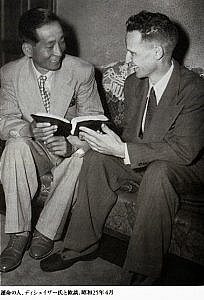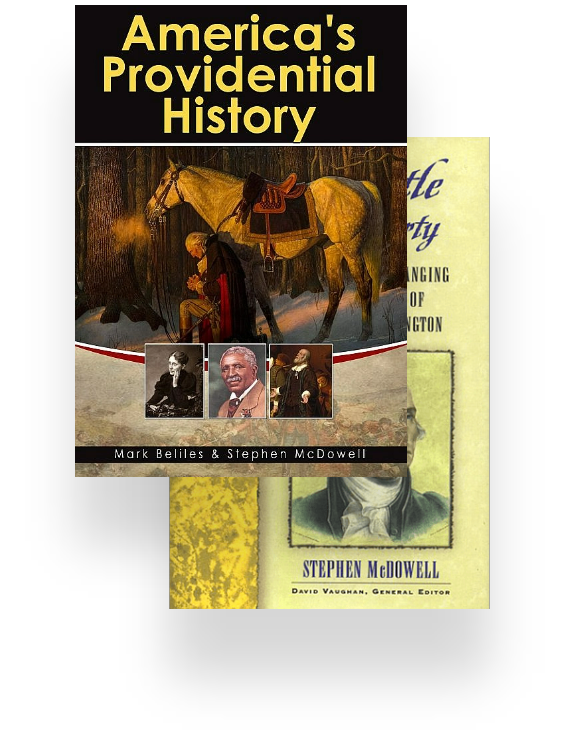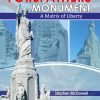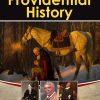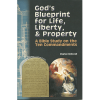Abraham Lincoln’s Faith
 For PDF Version: Abraham Lincoln’s Faith
For PDF Version: Abraham Lincoln’s Faith
In response to being presented a Bible on September 7, 1864, Abraham Lincoln said:
In regard to this Great Book, I have but to say, it is the best gift God has given to man. All the good Saviour gave to the world was communicated through this book. But for it we could not know right from wrong. All things most desirable for man’s welfare, here and hereafter, are to be found portrayed in it.[1]
This is the view many would have of Lincoln’s faith, but some people have presented Lincoln in a different light, including some who knew him well. William Herndon, Lincoln’s law partner for about 18 years, said of him: “As to Mr. Lincoln’s religious views, he was, in short, an infidel. . . . Mr. Lincoln told me a thousand times that he did not believe the Bible was the revelation of God as the Christian world contends.”[2]
Skeptics of Lincoln’s Christian faith have portrayed him as not just an unbeliever but as a scoffer. Charles Minor records of Lincoln that “when he went to church, he went to mock and came away to mimic.”[3] Yet, Rev. James Smith, the pastor of the First Presbyterian Church in Springfield where Lincoln attended for over 10 years, gives a much different picture. Replying to a number of questions posed in a letter from Herndon, Smith wrote: “With regard to your second question, I beg leave to say it is a very easy matter to prove that while I was pastor of the First Presbyterian Church in Springfield, Mr. Lincoln did avow his belief in the divine authority and inspiration of the Scriptures.”[4]
Which of these views is right? Why the contrary views? Views of Lincoln’s faith can differ depending upon the source of information and the time period considered. Lincoln had many friends and enemies, some of whom were certainly not objective when evaluating his life. Lincoln also underwent a change in his beliefs over the years. Thus, to accurately understand his faith, we must consider who is testifying and the time period they are representing of Lincoln’s religious views.
Some Early Biographies
A recap of a few early biographies of Lincoln will be helpful. These include authors that treat his faith positively as well as those who present him as an infidel. There is no shortage of books on Lincoln – about 15,000 have been written – nor on his religion, with likely over 100 books and an untold number of articles.
During his presidential campaign, an autobiography and a few short biographies were hurriedly published but contain little insight into his faith. In 1865, the year Lincoln died, J. G. Holland wrote the first analysis of the character of Lincoln in his book, The Life of Abraham Lincoln. Holland gives a positive treatment of Lincoln‘s faith. It contains an account of Newton Bateman’s, part of which Ward Hill Lamon took issue with in his biography of 1872. Mr. Bateman, Superintendent of Public Instruction for the State of Illinois for fourteen years and President of Knox College for 17 years, was a friend of Lincoln from 1842 until his death, having an adjoining Law office for 8 months prior to Lincoln going to Washington and serving as one of the pallbearers at his funeral. Part of Bateman’s statement that Lamon considered untrue were these words attributed to Lincoln, in particular the statement on Christ’s divinity:
I know there is a God, and that He hates injustice and slavery. I see the storm coming, and I know that His hand is in it. If He has a place and work for me—and I think He has—I believe I am ready. I am nothing, but truth is everything. I know I am right because I know that liberty is right, for Christ teaches it, and Christ is God.[5]
Lamon’s biography was based on manuscripts from William Herndon, Lincoln’s law partner for many years. It was the first source presenting Lincoln as infidel and had a bad reception. Lamon records a number of testimonies from men saying Lincoln was an infidel, yet, there were some problems with Lamon’s statements, as will be discussed below. He relates Lincoln’s burnt book story from his earlier years, contending Lincoln wrote an essay “intended to demonstrate,—first, that the Bible was not God’s revelation; and secondly, that Jesus was not the Son of God.”[6] Lamon quotes John Stuart as saying Lincoln was an avowed and open infidel and sometimes bordered on atheism. Yet, as is discussed below, Stuart refuted Lamon’s and Herndon’s presentation of his views.
In 1889 William Herndon wrote a three-volume biography on Lincoln which reiterated some statements of the infidelity of Lincoln while correcting some errors of Lamon. Parts of it received much opposition. It was reissued later with most offensive parts removed. Herndon portrays Lincoln’s faith in his younger years.
Two other important biographies of the late nineteenth century were the ten-volume set written by John Nicolay and John Hay (1890), Lincoln’s former secretaries, and the two-volume set by John T. Morse, Jr. (1893). Many others followed. Likely the most vicious assault on Lincoln’s integrity came in The Real Lincoln written by Charles Minor. This work from 1904 relies heavily on Lamon and accepts his comments without review.
A review of Lincoln’s religious life will help us to understand the contrary views of Lincoln’s Christian beliefs.
Development of Lincoln’s Faith
Early Life
(1809-16, Kentucky; 1816-30, Indiana; 1830-37, New Salem, Illinois)
Abraham was born February 12, 1809, in Hardin County, Kentucky. His parents, Thomas and Nancy Lincoln, were Baptists of the frontier variety. They were greatly impacted by God at a camp meeting in 1806. Nancy’s family was very familiar with the religious fervor that was a part of these revival meetings – the Hankses were “great at camp-meetings.”[7]
During a time when the enthusiastic crowd awaited the “celestial fire” to fall at a meeting in June 1806,
a young man, who had been absorbed in prayer, began leaping, dancing, and shouting, while to his left a young woman, as though inspired by the example she had witnessed, sprang forward, her hat falling to the ground, her hair tumbling down in graceful braids, her eyes fixed heavenward, her lips vocal with strange, unearthly song, her rapture overflowing until, grasping the hand of the young man, they both began singing at the top of their voices.[8]
The family tradition identifies the couple as Thomas and Nancy Hanks, who were reportedly married the next week by Rev. Jesse Head.
In his early years, Abraham attended services held in log meeting houses and heard a variety of preachers. He read the Bible much in younger days, along with a few other books. He never drank, chewed, or smoked, nor was he heard to swear.[9]
His mother, Nancy Hanks, and step-mother, Sally Johnston, were both Godly women and taught him the foundations of the Christian faith. Nancy taught Abe and his siblings to read their Bible. Before his mother died, she told him: “I want you to live as I have taught you, and to love your Heavenly Father and keep His commandments.”[10] Lincoln later remarked: “All that I am or hope to be I owe to my angel mother.”[11]
His early life was hard and often the family went with little, but each meal began with a blessing. One day when the meal was only made of potatoes he remarked to his dad after prayer: “Dad, I call these mighty poor blessings.”[12]
The Lincolns moved to Indiana in 1816 and settled on Little Pigeon Creek, not far from the Ohio River. Abe’s mother died when he was nine years old. After his father remarried, his step-mother Sally continued the Godly training he had received early on. She said of him: “Abe was a good boy…. Abe never gave me a cross word or look, and never refused in fact or appearance to do anything I requested of him. He was a dutiful son to me always . . . the best boy I ever saw, or expect to see.”[13]
Abe loved and honored his parents. It was from them he received most of his early education. As a youth he developed a great thirst for education and read everything he could get his hands on. He once walked seven miles to borrow an English grammar. Biographer John Wesley Hill wrote that “he read every book he could borrow within a radius of fifty miles.”[14]
Lincoln wrote, “I never went to school more than six months in my life.”[15] Books he greatly enjoyed and thoroughly read in his youth included the Bible, Aesop’s Fables, Bunyan’s Pilgrim’s Progress, Shakespeare’s plays, Robinson Crusoe, and Weem’s Life of Washington. The Bible was his favorite book and he soaked in its teachings, language, and spirit. This shows up in his speeches throughout his public life.
At age 19 he carried a cargo of farm products to New Orleans to sell. While there he witnessed the slave markets, which revolted him greatly. It is reported he said: “If ever I get a chance to hit that thing, I will hit it hard!”[16]
In 1830 Lincoln, along with the rest his family, moved to New Salem, Illinois, where he worked a variety of jobs. He and a partner bought a store, which failed. Lincoln’s integrity was seen through his faithfulness to repay the debt over many years (his partner not only abandoned his part of the debt, but ran off with much money from the store). After this failure in business, he took up the study of law, believing he may be more suited to this vocation.
In 1832 he ran for the state legislature, but lost. In his platform of principles, he said all citizens should have the opportunity for some education so that they might be able “to read the Scriptures and other works, both of a moral and religious nature, for themselves.”[17]
During these years of early manhood, Lincoln was grappling with his own religious beliefs. Some charged him with infidelity, but men who knew him said they heard him deny it. He did have doubts on various subjects, in particular on the endlessness of future punishment. He based his thinking, however inaccurate, upon his reading of Biblical ideas. He believed that the immortality lost by man due to sin was restored in Christ. He believed Christ restored to the whole human race what had been lost through Adam’s sin. Some close acquaintances agreed with the assessment of his teacher Mentor Graham, who said he was “not an infidel, nor even a deist, but essentially a Universalist.”[18]
Abe was known for his honesty and kindliness of heart. His life was clean and wholesome. Throughout his life he did not drink alcohol nor smoke tobacco. He publicly advocated the cause of temperance.
. . . .
To read the rest of the story order a copy of Abraham Lincoln’s Faith from our online bookstore.
Providential Perspective booklets, like Abraham Lincoln’s Faith, are regularly sent to Providence Foundation Members. Join today!
Topics covered include:
- Development of his Christian faith in Springfield (1837-61)
- Herndon’s and Lamon’s Views of Lincoln’s Faith
- Attendance at First Presbyterian Church in Springfield
- Growth of faith as President
- His reliance on God and belief in Providence
- Examples of Lincoln’s faith
- Lincoln on the Bible
- Lincoln’s Christian character
- Lincoln and slavery
- Lincoln’s public display of faith
End Notes
[1]Complete Works of Abraham Lincoln: Speeches, Letters, and State Papers, edited by John G. Nicolay and John Hay, 1905. Quoted in William J. Johnson, Abraham Lincoln the Christian, 1913, reprinted by Mott Media, 1976, pp. 157-158.
[2] Ward H. Lamon, The Life of Abraham Lincoln from His Birth to His Inauguration as President, Boston: James R. Osgood & Co., 1872, p. 489, in William E. Barton, The Soul of Abraham Lincoln, New York: George H. Doran Co., 1920, p. 20.
[3] Charles L.C. Minor, The Real Lincoln, From the Testimony of His Contemporaries, Everett Waddey Company, 1904, Atkins-Rankin Co., 1928, republished by Sprinkle Publications, 1992, p. 26.
[4] Letter from James Smith to W.H. Herndon, 24th Jan. 1867, in Barton, p. 323.
[5] Barton, p. 20. For an analysis of the Bateman incident see Barton, pp. 114-127.
[6] Barton, p. 146. Barton shows how the story of Lincoln writing these words in a destroyed manuscript (the “burnt book”) is probably not true since Herndon received this information only from Matheny who was not there; and Lamon misrepresented Matheny in other quotes, as is discussed later.
[7] John Wesley Hill, Abraham Lincoln Man of God, New York: G.P. Putnam’s Sons, 1922, p. 10.
[8] Ibid.
[9] Barton, p. 55.
[10] Hill, p. 14.
[11] Hill, p. 13.
[12] Hill, p. 12.
[13] Hill, p. 19.
[14] Hill, p. 33.
[15] Hill, p. 27.
[16] Hill, p. 50.
[17] Hill, p. 41.
[18] Hill, pp. 136-137.




